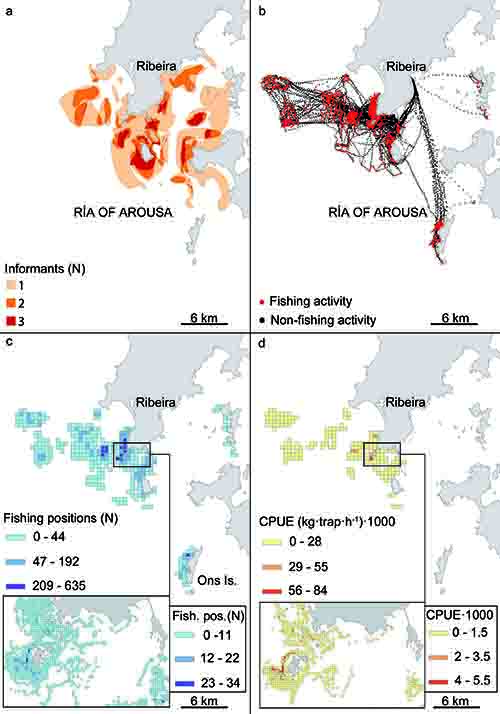Este es el artículo que acabo de publicar en Fisheries Research, y que se puede descargar de manera gratuita hasta el 2 de junio de 2016 en este enlace.
El título y el resumen del trabajo:
The use of the traditional ecological knowledge of fishermen, cost-effective tools and participatory models in artisanal fisheries: Towards the co-management of common octopus in Galicia (NW Spain)
Highlights
- • We have monitored a Spanish octopus fishery by using GPS-loggers and logbooks.
- • We have also used the knowledge of octopus fishermen to map their fishing grounds.
- • Annually, 700 vessels use traps to catch 2000 t of octopus that are sold for 13 M €.
- • The 174 km2 of fishing grounds identified were the most fished and valuable areas.
- • Creation of a long term co-management plan is recommended to ensure sustainability.
Abstract
The fishery of octopus Octopus vulgaris in Galicia (NW Spain) is a paradigmatic example of top–down management that generates conflicts between fishermen and policy makers. In the absence of scientific information to support the management of this data poor artisanal fishery, the traditional ecological knowledge (TEK) of fishermen was tested to map the distribution of fishing grounds and GPS data-loggers and log-books in order to estimate the intensity of effort and CPUE. Furthermore, a description of the social, technical and ecological features of the fishery was obtained to be used in conjunction with the results of questionnaires answered by experts, to improve the current management and to ensure the long-term sustainability of one of the most traditional and economically relevant fisheries in Galicia. Approximately, 700 vessels use traps in Galician coastal waters to catch 2000 t of octopus annually, with a market value of 13 M Є. Octopus vessels also use gillnets, hooks and lines and shellfish gathering to target common spider crab Maja brachydactyla, goose barnacle Pollicipes pollicipes and other species. The fishermen operating in the study area of the Ría of Arousa identified 174 km2 of octopus fishing grounds, mainly distributed in the mid and outer parts of the study area. The fishing effort was exerted on the same rocky reefs, also the most valuable fishing grounds in terms of CPUE. The use of new techniques and tools based on participatory models is encouraged to obtain cost-effective information of this fishery and in general of other fisheries in data poor environments. Likewise, the creation of a long-term co-management plan is recommended to ensure the sustainability of stocks and the profitability of this artisanal fleet.

